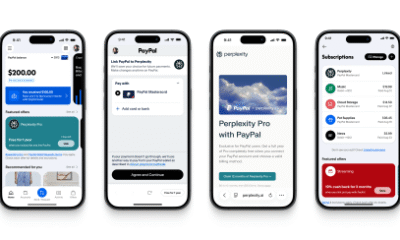AI Research
New Illinois law restricts use of AI in psychotherapy

Less than a year ago, Illinois state legislator Bob Morgan heard from a group of social workers. They asked him to look into artificial intelligence therapy bots.
Morgan said he heard “story after story of new apps and new examples of AI therapy bots that are really providing bad advice — and sometimes dangerous advice” to individuals dealing with substance abuse, psychosis, suicidal ideation, and other life-or-death issues.
In one particular example from a therapist, Morgan said a chatbot told a person with an addiction to take more drugs “because it felt good in the moment.”
So, the state representative got to work drafting a bill that bans therapists from using AI other than for administrative purposes, like notetaking or scheduling. The law also says chatbots cannot diagnose or treat mental illness — or market themselves as if they do.
“We’re stepping in and saying, if you’re an AI bot pretending to be a therapist, that is inappropriate, and we’re going to shut that down,” Morgan said.
Illinois is not the first state to pass legislation regarding the use of AI in psychotherapy. Utah and Nevada have passed laws this year to rein in the use of chatbots and other tools in mental health treatment.
This “patchwork approach” by the states is likely to continue, according to Vaile Wright, senior director of health care innovation at the American Psychological Association.
Wright said a federal approach is preferred because “then you would have some uniformity and greater specificity across the different states that could have better outcomes.”
But such regulation is unlikely, given efforts this summer by the U.S. House of Representatives to ban states from regulating artificial intelligence for a decade as part of President Donald Trump’s One Big Beautiful Bill Act. The U.S. Senate eventually voted to strike that provision from the bill.
Federal laws aside, Wright said AI therapy bans like Illinois’ don’t address one of the biggest issues plaguing her field: people going to generative AI platforms like ChatGPT and Character AI for mental health support.
“They call themselves companions; they say they’ll help with your loneliness. But when you read the fine print, they very clearly say, ‘We are not a therapeutic aid,’” Wright said.
She added that the business model for these platforms is to keep visitors on by being validating and reinforcing.
“Basically, they’re telling you exactly what you want to hear. This is the antithesis of therapy,” she said.
However, Wright does see a future where mental health chatbots are “rigorously tested, rooted in psychological science, co-created with experts, and they’ll have humans monitoring the interactions,” she said.
Such tools — if federally regulated — could help fill a void in the U.S.’s growing mental health crisis, Wright added.
Until then, licensed psychologists like Michelle Kalnasy Powell say they will watch and wait.
“I am skeptical about AI,” she said, adding that Illinois’ ban is a good starting point, but it may not go far enough.
Kalnasy Powell currently uses AI for billing, but not for taking notes during sessions with patients. Some of her peers use dictation software that complies with patient confidentiality laws.
“Even then, I question when I read the terms of service,” she said. “It’s kind of like sending a session off into the ether. What are you doing with that content? Is it really deleted?”
She added that her work is very personal and vulnerable.
“It is a privilege and an honor to be able to hear people’s stories, both the joy, the happiness and the sorrow,” she said. “[If] that would somehow wind up out there in a way that none of us could predict, but wind up harming the client — I’m just not willing to risk it.”
AI Research
Northwestern Magazine: Riding the AI Wave

Although Hammond says he barely remembers his life before computers and coding, there was indeed a time when his world was much more analog. Hammond grew up on the East Coast and spent his high school years in Salt Lake City, where his mother was a social worker and his father was a professor of archaeology at the University of Utah. Over the course of 50 years, Philip C. Hammond excavated several sites in the Middle East and made dozens of trips to Jordan, earning him the nickname Lion of Petra. Kris joined these expeditions for three summers, working as his father’s surveyor and draftsman.
“Now, once a week, I ask ChatGPT for a biography of my father, as an experiment,” Hammond says, bemused. “Sometimes, it gives me a beautifully inaccurate bio that makes him sound like Indiana Jones. Other times, it says he is a tech entrepreneur and that I have followed in his footsteps.”
While those biographical tidbits are more AI-generated falsehoods, Hammond and his father have both traced intelligence from different worlds — one etched in stone and another in silicon. Wanting a deeper understanding of the meaning of intelligence and thought, Hammond studied philosophy as an undergraduate at Yale University and planned to go law school after graduation. But his trail diverged when a fellow member of a local sci-fi club suggested that Hammond, who had taken one computer science class, try working as a programmer.
“After nine months as a programmer, I decided that’s what I wanted to do for a living,” Hammond says.
That sci-fi club guy was Chris Riesbeck, who is also now a professor of computer science at McCormick. Hammond earned his doctorate in computer science from Yale in 1986. But he didn’t abandon philosophy entirely. Instead, he applied those abstract frameworks — consciousness, knowledge, creativity, logic and the nature of reason — to the pursuit of intelligent systems.
“The structure of thought always fascinated me,” Hammond says. “Looking at it from the perspective of how humans think and how machines ‘think’ — and how we can ‘think’ together — became a driver for me.”
But the word “think” is tenuous in this context, he says. There’s a fundamental and important distinction between true human cognition and what current AI can do — namely, sophisticated mimicry. AI isn’t trying to critically assess data to devise correct answers, says Hammond. Instead, it’s a probabilistic engine, sifting through language likelihoods to finish a sentence — like the predictive text you might see on your phone while composing a message. It is seeking the most likely conclusion to any given string of words.
“These are responsive systems,” he says. “They aren’t reasoning. They just hold words together. That’s why they have problems answering questions about recent events.”
AI Research
America’s Biggest Cyber Crisis Isn’t Just Artificial Intelligence

In 2021, Patrick Hearn wrote “Digital Identity Is a National Security Issue,” where he argued that the U.S. government has put the safeguarding of digital identity on the back burner, despite hosts of threats from foreign adversaries. Four years later, we asked Patrick to revisit his analysis in light of advancements in cyber capabilities of both the United States and its adversaries.Image: U.S. Air Force (Photo by Airman 1st Class Andrew J. Alvarado)In your 2021 article, “Digital Identity Is a National Security Issue,” you argue the federal government has long treated digital identity as a secondary issue and should do more
AI Research
Futuri Announces Advancements to TopLine AI, Featuring Instant Custom Research, Sales Presentations, and CRM Integration to Help Teams Close Business Faster
AUSTIN, Texas, Sept. 3, 2025 /PRNewswire/ — Futuri has launched major AI upgrades to TopLine, its sales intelligence system trusted by media companies worldwide. Using Agentic AI that integrates directly into CRMs like Salesforce and HubSpot, TopLine is redefining how Sales Executives prepare, present, close, and renew business.
Closing the Gap Between Data and Revenue
With new CRM integration and AI-driven automation, TopLine equips sales teams to deliver custom client research and full presentations instantly, designed and ready to present without leaving the CRM they already use daily. This innovation reduces the need to bounce between multiple research tools, eliminating traditional bottlenecks and allowing sales teams to move at the speed of sales.
Key new CRM integration capabilities include:
- Direct sync with Salesforce, HubSpot, and other CRMs ensures that sales teams can seamlessly integrate TopLine intelligence into existing workflows.
- Automatic Personality Profiles + Digital Research – Instant insights into buyers and their markets.
- AI-Designed Presentations in Minutes – Polished, data-backed, and client-ready.
- Pre-Built Broadcast + Digital Schedules – Campaign proposals included, giving AEs a fast onramp to new revenue opportunities (with easy customization).
- Built-In Co-Op Opportunity Finder – Surfaces hidden funding sources to help close more deals.
- Trend + Business Opportunity Identification – Pinpoints where growth potential is emerging.
Accelerating Business Growth
“TopLine has always been about giving broadcasters a competitive edge in sales,” said Kathy Eagle, VP/GM of TopLine at Futuri. “We have built AI models that deliver research, creative, and campaign proposals in minutes instead of days. This empowers sellers to build trust faster, present smarter, and close more.”
Commitment to Broadcasters
These enhancements underscore Futuri’s mission to help broadcasters win more business in a competitive media landscape with less manual work. TopLine shortens cycles, improves win rates, and unlocks new revenue streams so sales teams can spend more time building relationships.
Media Contact:
For more information: www.FuturiMedia.com/TopLineCRM
Contact Mary Rogers | [email protected] | 877-221-7979 ext 450
About Futuri
Futuri is a global leader in AI solutions that drive audience and revenue growth for broadcasters, digital publishers, and content creators. Founded in 2009, Austin-based Futuri is at the forefront of AI-powered audience engagement and sales technology, trusted by thousands of broadcasters around the world. Key solutions include TopLine, a sales intelligence system designed to enhance local advertising sales and expedite the sales cycle; TopicPulse, an AI-powered story discovery system that provides real-time insights and predictions about trending topics; AudioAI, a cutting-edge system that enables broadcasters to create AI-powered hosts, streamline commercial production, and automate podcast creation; and POST, a system that automatically converts broadcasts into podcasts. More information about Futuri is available at www.FuturiMedia.com.
SOURCE Futuri Media

-

 Business5 days ago
Business5 days agoThe Guardian view on Trump and the Fed: independence is no substitute for accountability | Editorial
-
Tools & Platforms3 weeks ago
Building Trust in Military AI Starts with Opening the Black Box – War on the Rocks
-

 Ethics & Policy1 month ago
Ethics & Policy1 month agoSDAIA Supports Saudi Arabia’s Leadership in Shaping Global AI Ethics, Policy, and Research – وكالة الأنباء السعودية
-

 Events & Conferences4 months ago
Events & Conferences4 months agoJourney to 1000 models: Scaling Instagram’s recommendation system
-

 Jobs & Careers2 months ago
Jobs & Careers2 months agoMumbai-based Perplexity Alternative Has 60k+ Users Without Funding
-

 Education2 months ago
Education2 months agoVEX Robotics launches AI-powered classroom robotics system
-

 Funding & Business2 months ago
Funding & Business2 months agoKayak and Expedia race to build AI travel agents that turn social posts into itineraries
-

 Podcasts & Talks2 months ago
Podcasts & Talks2 months agoHappy 4th of July! 🎆 Made with Veo 3 in Gemini
-

 Podcasts & Talks2 months ago
Podcasts & Talks2 months agoOpenAI 🤝 @teamganassi
-

 Education2 months ago
Education2 months agoAERDF highlights the latest PreK-12 discoveries and inventions





















